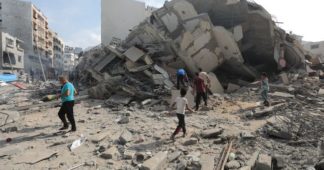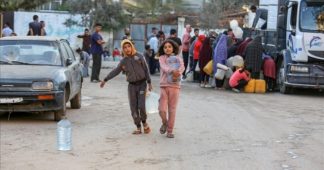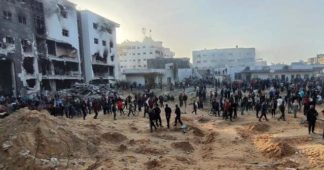Families return to their homes after the ceasefire, only to find widespread destruction, uncertainty and a difficult future ahead
By Ahmed Aziz in Khan Younis
and Ahmed Dremly in Gaza City, occupied Palestine
19 January 2025
As the long-awaited ceasefire between Israel and Hamas took effect on Sunday morning, thousands of displaced Palestinians rushed to return to their homes.
For many, the return was a bittersweet journey marked by shock, loss and uncertainty.
What they have returned to is mostly flattened homes and, at best, half-standing structures.
“I was so happy with the ceasefire, so I left the tent and moved east of Khan Younis towards my home,” said Ahmad Agha, a Palestinian originally from Khuza’a town in eastern Khan Younis.
However, upon arrival, the reality was far worse than he expected.
“I was shocked to find it completely levelled. A three-storey home was destroyed,” Agha told Middle East Eye.
“The last I heard is that it was partly destroyed and could be habitable. But I was surprised to see it completely gone.”
His once-thriving family home, which houses 10 people, was now nothing more than rubble.
Now left with nowhere to go, Agha faced a difficult decision.
“I don’t know where to go now. I’m now on the streets,” he said
“I’m unsure whether to stay near my home or return to the makeshift camp.”
Many shared similar stories with MEE. For them, the ceasefire has brought little relief. With their homes gone, the uncertainty of what lies ahead looms large.
‘We found it destroyed’
In the once-bustling neighbourhood of Tal al-Hawa in Gaza City, Izzat Qishawi returned to check on his family home, having been displaced to central Gaza City.
The night before his return, Qishawi could not shake the anxiety that gripped him as he thought about his house and its contents.
“I was thinking all night about the house and whether it was still there and all the belongings. We couldn’t sleep thinking about it,” he told MEE.
Together with his family, Qishawi set out early in the morning to return to Tal al-Hawa.
However, their journey was marred by Israeli shelling during the ceasefire’s delay.
“Between 8.30am (6.30am GMT) and 9:00 am, my father, mother, brother, and I began heading to Tal al-Hawa. But before we reached the house, we heard the rumours about the delay and the gunfire and shelling,” he explained.
Just 100m from their destination, he saw a drone drop a bomb and kill one person and wound others.
“We expected this to happen because you can never trust the Israelis.”
When Qishawi and his family finally arrived at their home, they were met with devastation.
“We found it destroyed. We managed to recover some clothes and other items,” he said.
However, the house was “uninhabitable,” and the entire Tal al-Hawa area was similarly wrecked.
“The entire area is not fit for human habitation,” Qishawi added.
With such severe damage, he and his family are now left to find a place to rent. But the soaring cost of living presents yet another challenge.
“Prices have tripled,” he lamented.
Unbearable tent life
For Mohammad al-Astal, also from eastern Khan Younis, the return was less shocking but no less challenging.
“Our entire area is destroyed. The upper floor of our home is gone, but the lower floor can be salvaged,” he explained.
“It needs some restorations, but it could work.”
Astal remains hopeful that with the ceasefire holding, his family may be able to return to their home.
“We can’t live in the tents any longer,” he said, citing the toll months of displacement have taken on his family.
His wife, who suffers from high blood pressure and diabetes, has been particularly affected.
“She suffers in the tents,” Astal said.
For him, the possibility of returning to a home, even one that requires repairs, offers a much-needed sense of stability.
Restricted areas
Rafeeq Mahmoud, originally from Rafah, shared a similar longing to return home despite the devastation.
Having been displaced in Khan Younis for the past eight months, Mahmoud was unable to make the journey back to his hometown immediately.
“I couldn’t head to our home because some people tried to reach the area and were killed. It seems Israeli forces are still stationed there,” he explained.
Mahmoud had heard reports that his house had been bombed and flattened, and when he asked others about the situation, the news confirmed his worst fears.
“The entire area is destroyed,” he said.
Yet, despite the loss, Mahmoud’s connection to his home remains strong.
“We lived a normal life before the war in Rafah. But this war changed everything. Every day was worse than the previous.”
Despite the destruction, Mahmoud remains hopeful that he can return once the area becomes safe.
“If the area becomes safe, I will immediately return, even if it’s destroyed,” he said.
“Who would reject such a thing? It’s my home and where I grew up.”
We remind our readers that publication of articles on our site does not mean that we agree with what is written. Our policy is to publish anything which we consider of interest, so as to assist our readers in forming their opinions. Sometimes we even publish articles with which we totally disagree, since we believe it is important for our readers to be informed on as wide a spectrum of views as possible.











